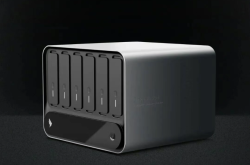Mysterious shareholder Jin Bin chases profits from Huawei concept, the winner behind the quadrupled bull stock Changshan Beiming
![]() 11/07 2024
11/07 2024
![]() 439
439

Image Source: Visual China
Blue Whale News, November 6 (Reporter Wang Xiaonan) Relying on Huawei's HarmonyOS concept, Changshan Beiming (000158.SZ) has told a vivid capital story.
Within two months, Changshan Beiming's share price has increased by more than four times. The surging Changshan Beiming has also allowed investors lurking within to reap huge profits, including mysterious retail investors like Jin Bin, who entered the market in the third quarter of 2024.
Riding on the surge in Huawei concept stocks, Jin Bin carries retail investors to chase profits in Huawei concept
On November 6, Changshan Beiming closed at 33.03 yuan/share, down 7.09%, with a market value of 53.6 billion yuan. Earlier, on November 1, Changshan Beiming's share price surged to 39.88 yuan/share, hitting a record high.
Investors flocked mainly because Changshan Beiming was listed as a Huawei HarmonyOS concept stock in the market. In the 2024 mid-year report, Changshan Beiming stated that its wholly-owned subsidiary Beiming Software is one of Huawei's important core strategic partners, holding multiple partner statuses such as "Huawei Multi-Product Diamond Level Distributor" and "Huawei Cloud Core Solution Provider".
On August 23, Changshan Beiming announced that it had been invited to participate in Huawei's Connect event in September. The company's share price rose to the daily limit that day, initiating a surge. Subsequently, in September, the HarmonyOS NEXT system entered public beta testing, and Changshan Beiming's share price continued to rise. Calculated from the closing price of 6.28 yuan/share on August 22 to the closing price of 33.03 yuan/share on November 6, Changshan Beiming's share price increased by over 400% within two months.
The surging Changshan Beiming has also allowed investors lurking within to reap huge profits, including mysterious retail investors like Jin Bin, who entered the market in the third quarter of 2024.
According to Changshan Beiming's third-quarter report, Jin Bin, Pang Genkui, Liu Kai, and Yu Qiaoying appeared on the list of the top ten shareholders. Among them, Jin Bin holds a 1.65% stake and is the third largest shareholder of Changshan Beiming. He is also on the list of the top ten shareholders of Runhe Software, Farben Information, and COFCO Capital, which are also Huawei HarmonyOS concept stocks. The other three retail shareholders, in addition to holding Changshan Beiming, also appear on the list of shareholders of other listed companies. Pang Genkui holds a 0.85% stake in Yinbang Stocks, Liu Kai holds a 0.18% stake in Semo Intelligence, and Yu Qiaoying holds a 0.79% stake in Eternity and a 0.38% stake in Lenco Technology.
According to statistics released by Tonghuashun on November 3, the profits of the four retail investors Jin Bin, Pang Genkui, Liu Kai, and Yu Qiaoying all exceeded 100 million yuan. Notably, Jin Bin earned 620 million yuan and 216 million yuan from Changshan Beiming and Runhe Software, respectively, totaling 836 million yuan in profits, ranking first. The above four retail investors favor Huawei concept stocks, and both Changshan Beiming and Runhe Software, from which they profited, are Huawei concept stocks.
Contrary to the precise entry of the above-mentioned mysterious retail investors, the "investment tycoon" Tencent was unable to share in the capital feast. Before Changshan Beiming's share price took off, Tencent significantly reduced its holdings in the company.
In September 2018, Linzhi Tencent invested approximately 299 million yuan to acquire 162 million asset management plan shares at a price of 7 yuan/share, corresponding to 42.847 million shares of Changshan Beiming.
In the first quarter of 2023, Linzhi Tencent reduced its holdings of Changshan Beiming by 34.2776 million shares, leaving only 8.5695 million shares in hand. By the first quarter of this year, Linzhi Tencent had disappeared from the list of Changshan Beiming's top ten shareholders. At that time, the company's tenth largest shareholder, Zhang Bixiang, still held 2.3967 million shares, which meant that Linzhi Tencent had continued to reduce its holdings by over 6.1728 million shares during the period.
Based on the quarterly average prices of 7.51 yuan/share and 8.5 yuan/share in the first quarters of 2023 and 2024, respectively, Linzhi Tencent cashed out approximately 260 million yuan and 52.46 million yuan at that time, totaling approximately 312 million yuan in cash-outs.
It is worth mentioning that Changshan Beiming's second-largest shareholder Beiming Weiye and related parties Li Feng and Ying Huajiang have also continuously reduced their holdings. According to incomplete statistics from Blue Whale News, from October 2018 to July 2023, Beiming Weiye and its related parties collectively cashed out and reduced their holdings by over 1.2 billion yuan, with over 260 million yuan cashed out in 2023.
After surging by over four times in two months to hit a record high, Changshan Beiming's share price seems to be returning to calm, but the joys and sorrows of the capital behind it are not interconnected.
Poor performance for years, aiming to revitalize assets through replacement?
Riding on Huawei's HarmonyOS concept, Changshan Beiming's share price surged by over four times in two months, attracting investors flocking in. However, not only is Changshan Beiming's own performance sluggish, but so is that of its wholly-owned subsidiary Beiming Software.
According to the official website, in December 1998, Shijiazhuang Changshan Textile Co., Ltd., established through the restructuring of Shijiazhuang Cotton Textile Mills 1 to 4, was the predecessor of Changshan Beiming. In July 2000, Changshan Textile was listed on the Shenzhen Stock Exchange.
As an early domestic textile leader, Changshan Textile, which started as a textile business, aimed at the software field after failing to transition to real estate and still relying on the textile business for survival. The main entity is Beiming Software.
On April 2, 2015, Changshan Textile announced plans to issue 441 million shares at a price of 4.92 yuan/share to 47 transaction counterparties including Beiming Weiye to purchase a 100% stake in Beiming Software. In October 2017, the company changed its name to Changshan Beiming.
Currently, Changshan Beiming's main business includes software information technology services and textile business. Among them, software information technology services are the company's primary source of revenue, accounting for over 70% of total revenue in the first half of 2024. The textile business, mainly consisting of cotton, cotton yarn, and grey fabric products, is in a state of loss.
In the long run, the transformation effect of Changshan Beiming is not clear. Its revenue scale has stagnated, and its profitability has not improved.
After revenue reached 11.25 billion yuan in 2017, Changshan Beiming's revenue scale declined to 9.007 billion yuan in 2023. Even the company's net profit attributable to shareholders has been decreasing year by year, falling from 355 million yuan in 2017 to a loss of 96 million yuan in 2023, and a loss of 208 million yuan in 2022. The company's net profit after deducting non-recurring gains and losses, which reflects its true profitability, has been in continuous loss for the past eight years.
In the third quarter of 2024, Changshan Beiming achieved revenue of approximately 4.91 billion yuan, an increase of 5.6% year-on-year, and a net loss attributable to shareholders of 285 million yuan, a year-on-year decrease of 118.43%. At the same time, the performance of Changshan Beiming's main business, Beiming Software, was not outstanding. In the first half of 2024, Beiming Software's revenue was 1.802 billion yuan, with a net loss of 47.655 million yuan.
Faced with years of poor performance, Changshan Beiming aims to revitalize its existing business through asset replacement, and this move has reignited the company's share price.
On October 28, Changshan Beiming announced that it plans to introduce new energy and smart city businesses that have a synergistic effect with its software business while divesting its textile business.
According to the announcement, Changshan Beiming plans to exchange the 100% equity of its wholly-owned subsidiary Changshan Hengxin for the 100% equity of energy investment held by Huifa New Energy, a subsidiary of Changshan Group, and the 80% equity of smart industry held by Huirong Technology, another subsidiary of Changshan Group. Since the counterparty to the transaction is Changshan Group, the controlling shareholder of Changshan Beiming, this asset replacement by Changshan Beiming constitutes a related party transaction.
Among the assets to be acquired, energy investment is primarily engaged in photovoltaic and wind power generation, charging pile business, industrial park investment and operation, real estate leasing, and property management services. Wind power generation and industrial park investment and operation are still under construction and have not generated revenue. Another asset to be acquired, smart industry, mainly provides smart city solutions and sells information integration equipment related to smart city construction for governments and enterprises.
However, the above-mentioned assets to be acquired are all in a state of loss. From January to April 2024, the revenues of energy investment and smart industry were 4.2399 million yuan and 19.9659 million yuan, respectively, with net losses of 3.4961 million yuan and 6.8468 million yuan, respectively.
Although the acquired enterprises have not yet turned a profit, by divesting the loss-making textile business, Changshan Beiming seems to be able to "earn" a sum of cash. According to the announcement, the transaction price for the assets to be divested by Changshan Beiming is 2.152 billion yuan, and the transaction price for the assets to be acquired is 607 million yuan. The difference between the divested assets and the acquired assets will be made up in cash. Based on this calculation, Changshan Beiming will receive a cash compensation of 1.545 billion yuan from Changshan Group.
In recent years, Changshan Beiming has faced considerable debt repayment pressure. The company's asset-liability ratio has risen from 55.14% in 2016 to 66.29% in 2023. In the first three quarters of 2024, Changshan Beiming's asset-liability ratio was 66.7%. As of the first three quarters, Changshan Beiming's monetary funds were only 1.218 billion yuan, while short-term borrowings were 3.556 billion yuan, and non-current liabilities due within one year were 747 million yuan.




